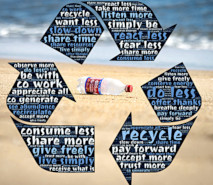
In our latest blog on the issues raised by COP26, Dr Francis Oremo of the University of Nairobi explains why addressing plastic pollution and the wider climate crisis requires not just cleaner manufacturing or improved recycling but a complete rethink of our relationship to the planet.
The increasingly serious impact of the plastic crisis on environment is a major concern for humankind. Despite limited information, all available evidence suggests that plastic impact on global climate change is real, significant and urgent. The production, use and disposal of plastics are major contributors of greenhouse gases (GHG) and other pollutants which are harmful to the environment and human health. GHG emissions occur at every stage of the plastic life cycle, including extraction and transportation of plastic raw materials, manufacturing processes, waste management and degradation of environmental plastics.
Climate change is expected to have widespread impacts on communities, and their interactions with natural environment. There are signs that the impacts of climate change are already being felt in many parts of the world. The problem, whose scope entails not only increases in temperature and erratic rainfall, but also extreme events such as droughts, floods and cyclones, requires collaborative actions and all-hands approach, working across sectors and governing levels. Accordingly, the Paris Agreement reached at COP21 in 2015 committed governments to collectively pursue efforts to limit global warming to 1.5 degrees by 2050 in order to avoid a series of catastrophic impacts. Holding global warming to 1.5 degrees requires deep emission cuts. This will largely be attained through transforming the production and consumption patterns. However, continuing expansion in plastic production and use will make it difficult to attain the 1.5 degrees temperature goal.

GHG emissions from plastics have an upwards trajectory, and are expected to rise further in the coming decades due to rising plastic production and accumulation of wastes in the environment. Currently, recycling, incineration and landfill – all of which release a lot of GHGs – are used to manage plastic wastes. Still more carbon is emitted during plastic incineration and recycling. Further emissions – which are still largely unaccounted – are released during the degradation of plastics dumped into the terrestrial and marine environment. Although emissions from degrading plastics are relatively small compared to plastic incineration and recycling, it is a continuous process and its impact will become increasingly significant with the increase of plastic production and accumulation of wastes.

Oceans absorb large quantities of carbon – about 40 percent of carbon emissions associated with human activities. However, the widespread presence of plastics in marine environments may interfere with ocean’s capacity to fix carbon. Marine plants and animals absorb and sequester carbon from the atmosphere and transfer it to the deep sea. With increased accumulation of plastics in the oceans, the ability of microscopic plants (phytoplankton) to fix carbon through photosynthesis will be compromised.
The plastic pollution and climate crises are interconnected and require joint solutions. Strategies geared towards reducing plastic production and use should be considered as part of climate solutions. These include imposing a total ban on single-use plastics, fostering the transition to zero-waste communities and circular economy, and adopting and enforcing targets to reduce GHG emissions from the plastic sector.

Rethinking plastics regulation to bring in climate change perspective is not only important but essential to tackle global warming. Thanks for the analysis.
It is an interesting point that the presence of plastics in the oceans might impact on the carbon cycle (is it correct to call it that?). It is easy to think of plastics as just a bit of solid waste but they are much more impactful than that. Another aspect of our ability to disrupt the natural processes of the earth.
It is important to reinforce the message that the environmental impacts of plastics production and disposal are connected to the broader climate crisis.